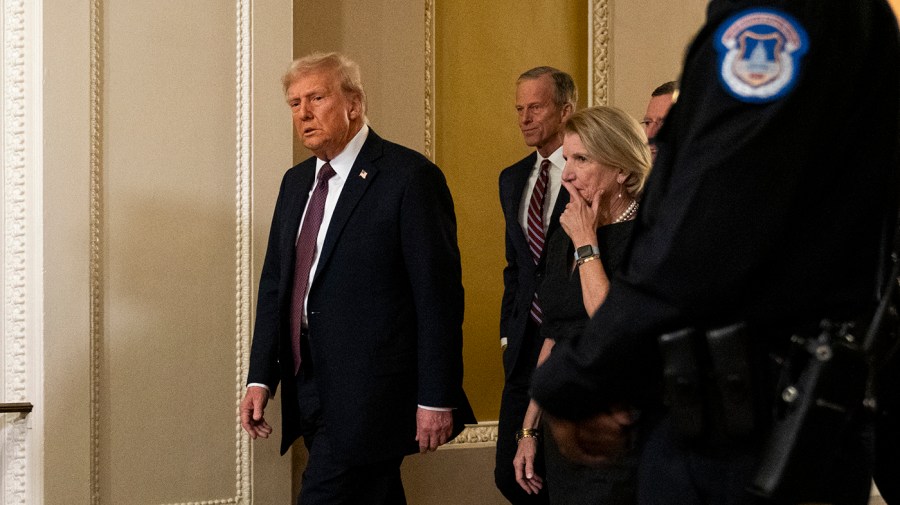
President-elect Trump is looking to get Republicans in line, hosting meetings with House and Senate lawmakers this week to avoid any surprises that could stall his agenda.
Trump met earlier this week with Senate Republicans in Washington and he is spending the weekend at Mar-a-Lago hosting several factions of the House GOP in an effort to quell any dissent over a host of complicated and onerous legislative matters.
The effort has Trump leaning into his undisputed grip on the party as he pushes toward ambitious, sweeping plans in his first few months in office. He has pledged mass deportations, regulation cuts and a legislative package that includes border security funding, tax policy and investments in energy production.
Those plans will require constant communication and organizing to make sure various segments of the GOP are on board, especially in the House where Republicans can only afford a few defections on any party-line vote.
Trump and his allies have signaled there will be a carrot and stick approach, even as he and his advisers seek to remind Republicans that a primary challenge could be looming if they fall out of line.
“He is not afraid to express his opinion publicly and clearly. That’s what he’s done on policy and that’s what he intends to get done as the president, and he expects the majorities in congress to help him with that,” James Blair, who will serve as a deputy chief of staff in Trump’s White House, said in a recent Fox News interview.
“He is the one with the mandate, and the will of the people is behind him, and I think he will use that to his benefit to make sure the policies he ran on get enacted,” Blair added.
Trump himself has spoken about his relative inexperience and lack of familiarity with the people and workings of Washington upon arriving for his first term in office, and Trump struggled to pass health care reform or get an infrastructure package off the ground in his first few months in office in 2017.
But things appear to be different this time around, with Trump getting more of a head start before he gets to the White House instead of the mad scramble after he won the 2016 election.
Trump met Wednesday night with Senate Republicans in Washington. The two-hour discussion focused largely on whether to split Trump’s agenda into two separate reconciliation bills, though the president-elect has expressed a preference for wrapping border security and tax policy into one massive piece of legislation.
The president-elect on Thursday night hosted Republican governors at Mar-a-Lago. The meeting mostly served as a way for Trump and the governors to present a united front before he takes office – Trump described it as “a love fest” – though state leaders are likely to be key in Trump’s plans to carry out mass deportations.
Trump’s weekend will then be filled with meetings with dozens of House Republicans at Mar-a-Lago. He met separately with various Republican groups, including the House Freedom Caucus on Friday. On Saturday and Sunday, he will sit down with GOP committee leaders and then members with a particular interest in changing the state and local tax deduction (SALT) in upcoming tax policy negotiations.
The GOP can only afford a few defections on reconciliation bills in order to pass them with a simple majority, and Trump’s ability to exert pressure over lawmakers to get in line could be the difference between passage and failure.
“That’s why I think it’s going to be one of the most successful four years of four years in modern history,” said Sean Spicer, who served as Trump’s first White House press secretary. “They know each other, which is important for most of these guys…Number two is, right now it’s heresy not to be out in front of helping him.”
The president-elect has already shown a willingness to get involved, both privately and publicly, when Republican members don’t fall in line with his preferences since winning a second term. Trump spoke on the phone with two GOP members who initially didn’t back Mike Johnson (R-La.) for Speaker, leading to both lawmakers to shift their votes and secure the gavel for Johnson.
Trump used a more forceful approach when he was lobbying Republicans to include a debt ceiling increase as part of government spending talks. The president-elect posted on social media that any Republican who did not support a debt ceiling increase should face a primary challenge, and he specifically called out Rep. Chip Roy (R-Texas), an independent-minded member of the House Freedom Caucus.
The president-elect’s threats were backed by Elon Musk, his billionaire ally, who similarly argued Republicans who backed a spending bill he disliked should be primaried.
Republicans ultimately bucked Trump and passed a spending bill without a debt ceiling increase. But once he takes office, Trump’s team is hoping the entire party will be on the same page to make the most of unified control of Congress and the White House.
Some allies of the president-elect have also argued the last few weeks should serve as a reminder to GOP members of Congress of Trump’s strength with Republican voters.
“We only have the House and the Senate, frankly, because of my father, because he was able to bring some of those candidates across that line,” Donald Trump Jr. said on Fox News. “Obviously, I think we got a lot of great new candidates in the Senate and some in the House. But I think they have to get in line.”

